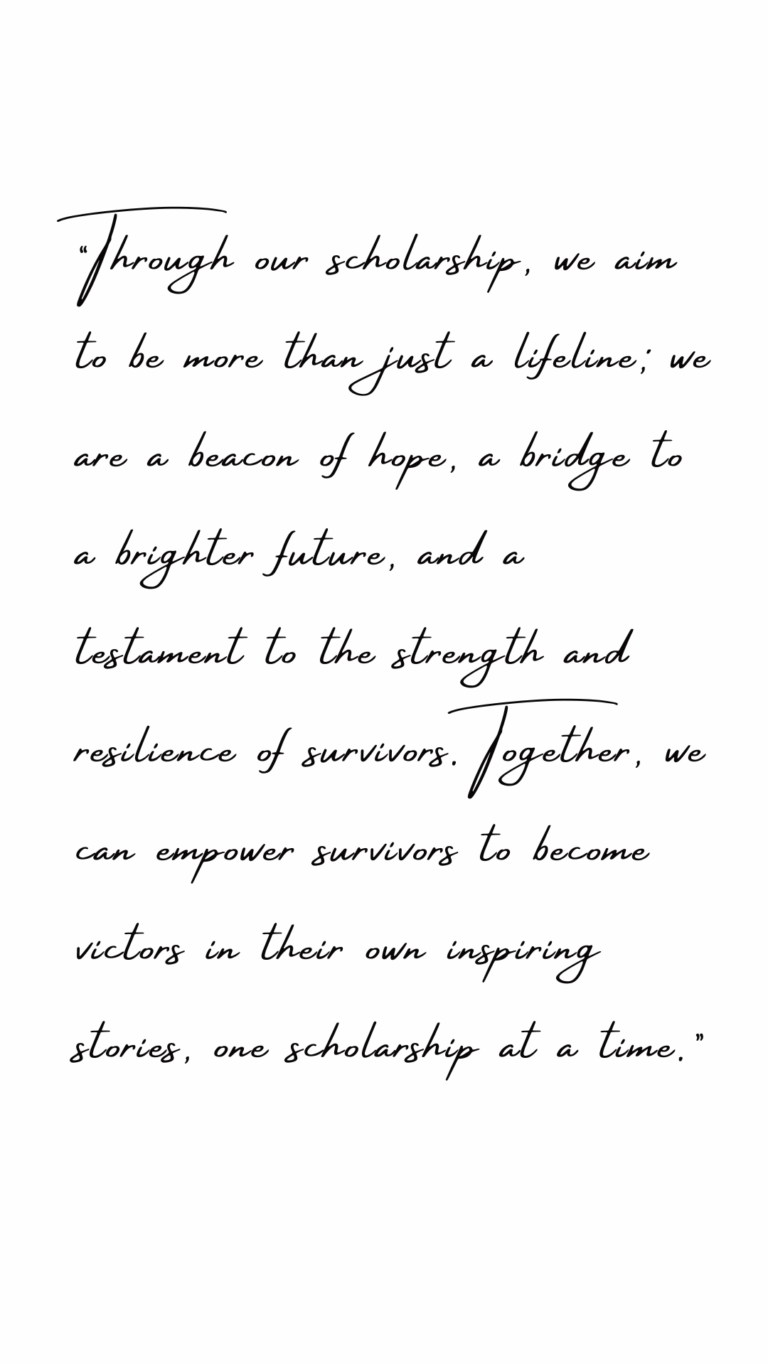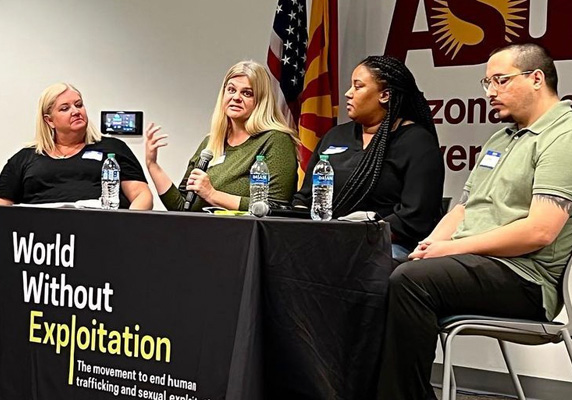Scholarship
The Jade Richard Scholarship Fund
The Jade Richard Scholarship Fund has been established to honor the legacy of Arizona Survivor Leader Jade Richard who unexpectedly passed away in June 2022, only a month after graduating with her bachelor’s degree. Jade was a beacon of light in the anti-trafficking community and worked at the Phoenix Dream Center serving both male and female victims of human trafficking. She was a role model and mentor to those in the program as well as those in the community. Her legacy lives on to encourage survivors to continue with their educational goals and dreams.


This fund supports the education of survivors of human trafficking who are pursuing a higher education, trade school, advanced certificates, or other career readiness programs.
The scholarship is designed for those who have experienced the exploitation of human trafficking through the commercial sex industry or through labor trafficking, as defined by the U.S. Federal government*.
To be eligible for this scholarship, it’s not required that you have prosecuted your trafficker or assisted in an investigation against them.
For Our Generous Donors
Your partnership and donations help our scholarship recipients to begin higher education and/or job-training courses that would help toward self-reliance, becoming economically empowered and obtaining livable employment.
Your donation empowers survivors of human trafficking, offering them the opportunity to rebuild their lives through education, a vital tool for regaining independence and self-worth. Additionally, it contributes to breaking the cycle of human trafficking by providing the means to secure employment and lead self-sufficient lives, thus reducing the risk of re-victimization.
By donating to this fund, you actively participate in strengthening communities, creating hope for a brighter future, and fulfilling your social responsibility in the fight against human trafficking. Your support for the Jade Richard Scholarship Fund is instrumental in transforming lives and contributing to a world where human trafficking is eradicated and an Arizona where no one is bought, sold or exploited.
Ways to submit your scholarship application can be found in the application document
Frequently asked questions
That is because we do not have a set deadline on application submissions.
Our scholarship committee meets on a regular basis to evaluate the scholarship applications we have received.
We encourage all applicants to turn in their applications early and not wait until the last minute.
- Survivor human Trafficking*;
- Citizen or permanent legal resident (green card holder) of the United States; DACA or DREAMer; Special immigrant juvenile status and deferred action.
- Enrolled or planning to enroll at an accredited public or private post-secondary or vocational institution.
- Recommended by an agency and/or counselor or social worker, willing to provide information on behalf of the applicant.
- Residences currently in Arizona
Preferences for applicants:
- Survivor applicants seeking their first college degree or technical job training.
- Have completed at least one year of trauma counseling.
- Demonstrates financial need. (Are they receiving other scholarships or funding?)
The scholarship can be used for tuition assistance, class, academic fees, books, and supplies at accredited two and four-year colleges and universities and recognized career (trade, technical or vocational) schools.
The funds will be dispersed directly to the educational institution for the next applicable term or start date.
Tuition will be paid up front directly to the institution. No expectations will be made. Payments will be made in accordance with the schools’ policy on deadline for payments.
The amount of the award per applicant will be discussed as part of the evaluation process. We do not want to limit someone’s ability to further their education.
Scholarships will also be available to those who wish to seek advanced degrees.
You must maintain a grade point average of 2.5 or higher or a pass/fail where no GPA is applicable.
Official Transcripts must be submitted after each semester is completed. Additional funding will not be released prior to distribution of next semester of funding without a transcript and/or a signed release to be able to check for grades.
Funding semester to semester is not guaranteed.
After we receive your application we will:
- Applicants will receive an email from AATN to confirm we have received your scholarship submission.
- AATN will gather and assess all submitted applications and disseminate the applications to the scholarship committee. We reserve the right to contact applicants and ask for additional information needed to further evaluate your submission.
- Applicants will also be invited to participate in a virtual or in person meeting. This meeting is for advisory members to get to know the applicant as well as an opportunity to answer any additional questions or concerns that the applicants may have.
- During this period the advisory committee will be contacting your supportive figures.
- Applicants will be notified within 60 days of their submission on the decision regarding their application.
Personal Information that we collect, access, or process will be retained only as long as necessary for the fulfilment of the purposes for which it was collected. Personal Information that is no longer required to fulfill the identified purposes will be destroyed, erased, or made de-identified.
AATN will not use applicant information for any purpose other than to consider the applicant’s qualification for the scholarship, nor will AATN sell, share, or distribute applicants’ personal or contact information.
AATN reserves the right to post the scholarship recipient’s name, in whole or in part, on its website, social media accounts, annual events, or in a press release. Permission to share scholarship winners will be asked of all applicants.
Denial toward the request of publicity of winner’s name will have no bearing on application process.
You will not be penalized if you reach out to ask questions about the scholarship or application process.
We encourage all sponsorship applicants to reach out for assistance whenever needed. Your success is our priority, and our team is here to provide guidance and support throughout the application process, ensuring you have the best opportunity to achieve your goals.
You can reach us via email at scholarship@aatn.org
The Trafficking Victims Protection Act (TVPA) of 2000 is the first comprehensive federal law to address trafficking in persons. The law provides a three-pronged approach that includes prevention, protection, and prosecution. The TVPA was reauthorized through the Trafficking Victims Protection Reauthorization Act (TVPRA) of 2003, 2005, 2008, 2013, 2017, and 2018.
Under U.S. federal law, “severe forms of trafficking in persons” includes both sex trafficking and labor trafficking:
Sex trafficking is the recruitment, harboring, transportation, provision, obtaining, patronizing, or soliciting of a person for the purposes of a commercial sex act, in which the commercial sex act is induced by force, fraud, or coercion, or in which the person induced to perform such an act has not attained 18 years of age (22 USC § 7102).
Labor trafficking is the recruitment, harboring, transportation, provision, or obtaining of a person for labor or services, through the use of force, fraud, or coercion for the purposes of subjection to involuntary servitude, peonage, debt bondage, or slavery, (22 USC § 7102).

- Before you were age of 18, did you ever trade/exchange sex to meet your basic needs? Some examples of basic needs are: something of value such as money, a place to stay, drugs, protection, or clothing.
- Have you ever been forced or tricked into trading sex for something of value like a place to stay, protection, drugs, clothing, or food?
- Have you ever had a person force, trick, or pressure you to exchange/trade sex for money or other items? Examples of a person could include Boyfriend, Family Members, Manager, Pimp, Partner.
- Did you ever have sex for things of value (money, housing, food, gifts, drugs, or favors)?
- Did you work where it may be common to be pressured into performing sex acts for money, such as a strip club, illicit cantina, or massage business?
